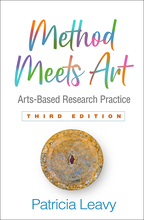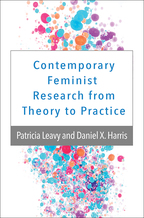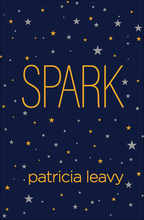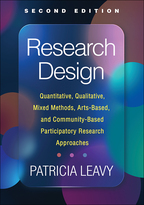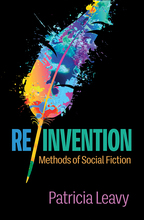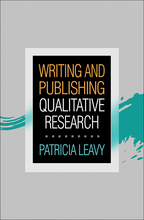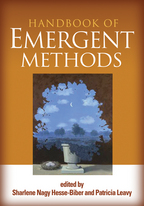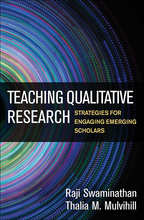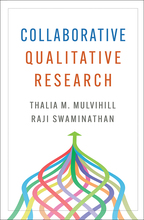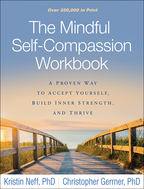Method Meets Art
Third Edition
Arts-Based Research Practice
Patricia Leavy
HardcoverPaperbacke-bookprint + e-book
Hardcover
orderAugust 12, 2020
ISBN 9781462544073
Price: $90.00 344 Pages
Size: 6" x 9"
Paperback
orderAugust 12, 2020
ISBN 9781462538973
Price: $60.00344 Pages
Size: 6" x 9"
Read a Q&A with featured author, Patricia Leavy!
Sign up for emails on upcoming titles by Patricia Leavy (with special discounts)!
Sign up for emails on upcoming titles by Patricia Leavy (with special discounts)!
“This is an exceptionally well-written and informative book. Leavy writes in a clear and informative manner that is easy to follow. She provides background information, sources, and examples that are sufficient even for readers with little to no knowledge of ABR….This field is still growing and Leavy's textbook has contributed to its advancement in many ways. The book is great for any kind of research methods, social science, or research courses.”

—Doody's Review Service
“An excellent introductory text for arts-based research (ABR)….It is time for the arts as research to reside in the research methods classroom and in research proper....Leavy adeptly relates the most basic techniques in ABR—giving them away to students and researchers alike. In addition, she exceeds the introduction of techniques by presenting excellent examples of ABR research by experienced ABR methodologists….It is an excellent resource for students, for beginning researchers, and for academicians in the arts, literature, and social and behavioral sciences.”

—PsycCRITIQUES (on the first edition)
“Leavy enables her readers to gain a sense of how a particular art form might suit their research needs and skills-set, while simultaneously validating each methodology and providing guidance over how specific research practice might be emulated.”

—Qualitative Research (on the first edition)
“I found the book interesting and one I believe will be useful for those wanting to embark on using a different approach to research....For those practicing counseling and psychotherapy, whether engaged in therapy and/or research and not familiar with using alternative methods of enabling people to capture experience I believe this book could offer fresh insights to support and further their endeavors.”

—Counselling and Psychotherapy Research (on the first edition)
“In reading Leavy's book I can now see that all forms of research can inform, perform, reform, and transform what we think we know about the world around as well as ourselves as researchers and readers.”

—Weekly Qualitative Report (on the first edition)
“A breath of fresh air....The contribution of this book to the field of research methods is invaluable....Leavy successfully establishes the legitimacy of arts-based research in social science research and succinctly explains how pivotal arts-based research is to the future of academic research.”

—International Journal of Education and the Arts (on the first edition)
“My students always love reading this book! This is often the first encounter that educators have with the idea that research could be different than the traditional science model or the less-traditional qualitative approaches more common in social science research. It has given some of my students a voice when they couldn’t find it themselves. With this text, I have a way to introduce students to more possibilities for doing and analyzing and sharing their work, often giving them permission to pay attention to the very parts of their research they thought they would need to omit. It is a paradigm shift—a real game-changer.”

—Mindi Rhoades, PhD, Department of Teaching and Learning, The Ohio State University
“Renowned editor, author, and scholar Leavy has created an outstanding third edition of Method Meets Art that articulately captures the breadth and depth of ABR. This highly readable and accessible book guides the understanding of the integral nature of this essential form of inquiry. Leavy has managed to achieve the impossible—a seminal work that should be a required text in research courses across a wide range of disciplines, including fine arts, social sciences, mental health, and education.”

—Cathy A. Malchiodi, PhD, Trauma-Informed Practices and Expressive Arts Therapy Institute, Louisville, Kentucky
“Leavy’s contribution to ABR is nothing short of extraordinary, and her third edition of Method Meets Art is no exception. She continues to update the genre and subgenres by providing new exemplars that advance both theory and practice. I look forward to adding this volume to Leavy's other publications on my ‘go-to’ shelf. The third edition reflects some major developments of the methodology, including the growing number of researcher/practitioners and Leavy’s expansion of complex theoretical, aesthetic, ethical, and pedagogical issues. In her search to find joy in her own research, Leavy has developed, supported, and promoted such joy within the ABR community and beyond.”

—Joe Norris, PhD, Department of Dramatic Arts, Brock University, Canada
“Since the first edition, I have assigned this text in all my graduate research courses. It is required reading for each class session, paired with written responses applying the concepts and practices. I especially appreciate the third edition's additional coverage of research design, which is a powerful aid in helping students understand research holistically. Discussions and examples of a variety of research questions and practices are most useful, as is the modeling of ways to communicate ABR findings to a diversity of stakeholders. The practicality, and, I have to say, beauty of this text lie in its accessibility for the student who is new to the world of research. It reinforces traditional research genres and protocols while giving researchers the courage, inspiration, and means to conceive of new questions and realize previously unseen realities.”

—Candace Jesse Stout, PhD, Department of Arts Administration, Education, and Policy (Emerita), The Ohio State University
—Doody's Review Service
“An excellent introductory text for arts-based research (ABR)….It is time for the arts as research to reside in the research methods classroom and in research proper....Leavy adeptly relates the most basic techniques in ABR—giving them away to students and researchers alike. In addition, she exceeds the introduction of techniques by presenting excellent examples of ABR research by experienced ABR methodologists….It is an excellent resource for students, for beginning researchers, and for academicians in the arts, literature, and social and behavioral sciences.”
—PsycCRITIQUES (on the first edition)
“Leavy enables her readers to gain a sense of how a particular art form might suit their research needs and skills-set, while simultaneously validating each methodology and providing guidance over how specific research practice might be emulated.”
—Qualitative Research (on the first edition)
“I found the book interesting and one I believe will be useful for those wanting to embark on using a different approach to research....For those practicing counseling and psychotherapy, whether engaged in therapy and/or research and not familiar with using alternative methods of enabling people to capture experience I believe this book could offer fresh insights to support and further their endeavors.”
—Counselling and Psychotherapy Research (on the first edition)
“In reading Leavy's book I can now see that all forms of research can inform, perform, reform, and transform what we think we know about the world around as well as ourselves as researchers and readers.”
—Weekly Qualitative Report (on the first edition)
“A breath of fresh air....The contribution of this book to the field of research methods is invaluable....Leavy successfully establishes the legitimacy of arts-based research in social science research and succinctly explains how pivotal arts-based research is to the future of academic research.”
—International Journal of Education and the Arts (on the first edition)
“My students always love reading this book! This is often the first encounter that educators have with the idea that research could be different than the traditional science model or the less-traditional qualitative approaches more common in social science research. It has given some of my students a voice when they couldn’t find it themselves. With this text, I have a way to introduce students to more possibilities for doing and analyzing and sharing their work, often giving them permission to pay attention to the very parts of their research they thought they would need to omit. It is a paradigm shift—a real game-changer.”
—Mindi Rhoades, PhD, Department of Teaching and Learning, The Ohio State University
“Renowned editor, author, and scholar Leavy has created an outstanding third edition of Method Meets Art that articulately captures the breadth and depth of ABR. This highly readable and accessible book guides the understanding of the integral nature of this essential form of inquiry. Leavy has managed to achieve the impossible—a seminal work that should be a required text in research courses across a wide range of disciplines, including fine arts, social sciences, mental health, and education.”
—Cathy A. Malchiodi, PhD, Trauma-Informed Practices and Expressive Arts Therapy Institute, Louisville, Kentucky
“Leavy’s contribution to ABR is nothing short of extraordinary, and her third edition of Method Meets Art is no exception. She continues to update the genre and subgenres by providing new exemplars that advance both theory and practice. I look forward to adding this volume to Leavy's other publications on my ‘go-to’ shelf. The third edition reflects some major developments of the methodology, including the growing number of researcher/practitioners and Leavy’s expansion of complex theoretical, aesthetic, ethical, and pedagogical issues. In her search to find joy in her own research, Leavy has developed, supported, and promoted such joy within the ABR community and beyond.”
—Joe Norris, PhD, Department of Dramatic Arts, Brock University, Canada
“Since the first edition, I have assigned this text in all my graduate research courses. It is required reading for each class session, paired with written responses applying the concepts and practices. I especially appreciate the third edition's additional coverage of research design, which is a powerful aid in helping students understand research holistically. Discussions and examples of a variety of research questions and practices are most useful, as is the modeling of ways to communicate ABR findings to a diversity of stakeholders. The practicality, and, I have to say, beauty of this text lie in its accessibility for the student who is new to the world of research. It reinforces traditional research genres and protocols while giving researchers the courage, inspiration, and means to conceive of new questions and realize previously unseen realities.”
—Candace Jesse Stout, PhD, Department of Arts Administration, Education, and Policy (Emerita), The Ohio State University

